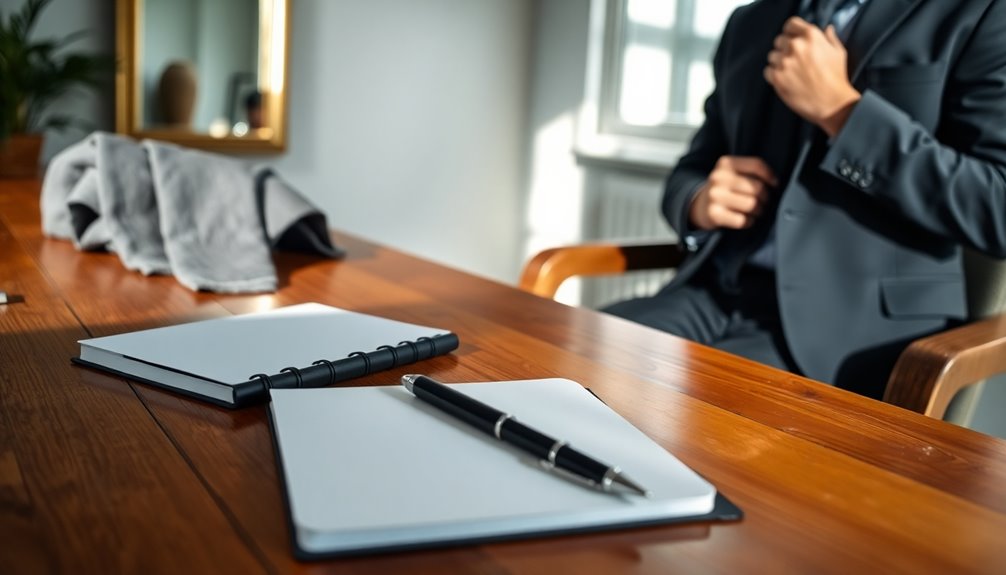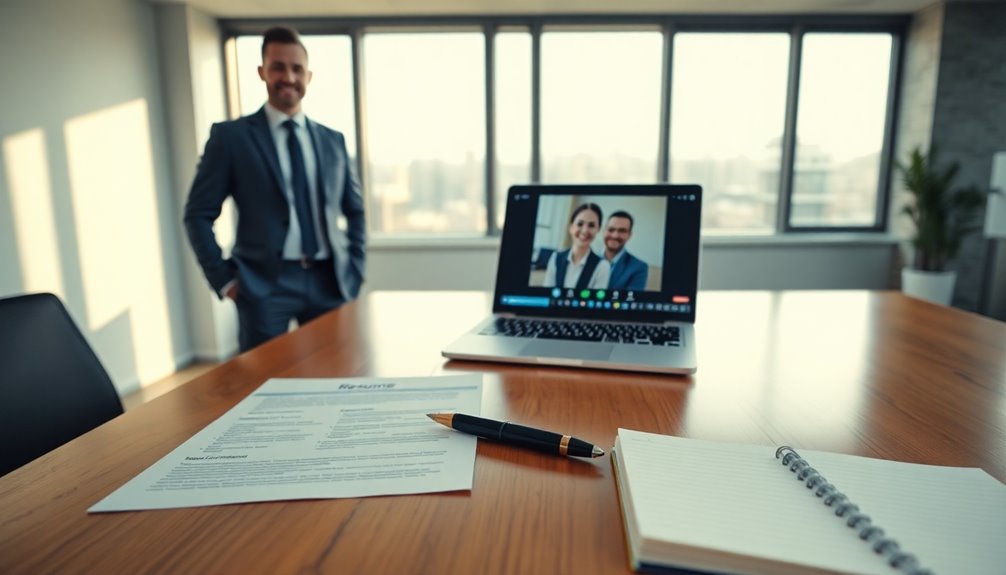Mastering your job interview introduction is essential for a successful start. First impressions matter, so project confidence and professionalism with a firm handshake and a genuine smile. Greet the interviewer warmly and state your full name clearly, ensuring eye contact to show engagement. Briefly mention the role you're applying for and connect your achievements to it. Practice your intro to keep it concise and free of filler words. Don't forget to research the company culture for better alignment. Remember, nailing your introduction sets the stage for a great conversation, and there's more to learn about making a memorable first impression!
Key Takeaways
- Begin with a genuine smile and a firm handshake to establish a welcoming atmosphere and convey confidence.
- Clearly state your full name and the role you're interviewing for to set a positive tone.
- Maintain eye contact and use the interviewer's name to enhance connection and engagement.
- Prepare a concise overview of your achievements and align them with the job requirements for a strong introduction.
- Practice your introduction to eliminate filler words and maintain a steady pace for clarity and professionalism.
Importance of First Impressions

First impressions matter, especially in job interviews where you have mere moments to make a lasting impact.
You'll want to project confidence and professionalism right from the start. Your body language plays an important role; a firm handshake and a genuine smile can set a positive tone.
When you introduce yourself, state your full name and job title clearly, ensuring your voice conveys enthusiasm. Eye contact is essential—it demonstrates your engagement and self-assuredness.
Remember, the initial moments shape the interviewer's perception, so approach this opportunity prepared and poised. A well-crafted introduction not only showcases your qualifications but also reflects your personality, making you memorable.
Aim to leave a lasting impression that resonates long after you've left the room.
Greeting Techniques for Success

Mastering greeting techniques can greatly enhance your chances of making a positive impression during an interview. A strong greeting sets the tone for the entire conversation, so focus on these key elements:
- Smile genuinely to create a welcoming atmosphere.
- Offer a firm handshake that conveys confidence.
- State your full name clearly, using a confident tone.
- Make eye contact to show engagement and assurance.
- Use the interviewer's name in your greeting to personalize the interaction.
Structuring Your Opening Statement

When you walk into an interview, having a well-structured opening statement can set a positive tone right from the start.
Begin by briefly stating the role you're interviewing for, like, "I'm excited to discuss the associate position today."
Follow this with a concise overview of your current situation, highlighting your major achievements. For example, you might say, "Currently, I manage a team at XYZ Corp, where we increased productivity by 20% last year."
Then, work backward through your relevant experiences, ensuring you connect your background to the role.
Conclude your statement with a clear assertion of how your skills align with the job's requirements, reinforcing your enthusiasm and readiness to contribute to the company's success.
Communicating Effectively

Effective communication during your job interview can greatly impact the impression you leave on your interviewer. To guarantee you convey your message clearly and confidently, focus on these key strategies:
- Keep your introductions concise and to the point.
- Speak loudly enough to be heard without straining.
- Maintain a steady pace to enhance comprehension.
- Avoid filler words like "um" or "like" to sound more professional.
- Use inviting language and pay attention to the interviewer's nonverbal cues.
Highlighting Personal Background

To make a strong impression, it is essential to briefly share your personal background at the start of the interview. Start with your name and where you're from, then touch on your educational achievements and relevant experience. This helps to build rapport and gives a context to your professional journey.
| Element | Details |
|---|---|
| Name | Your full name |
| Origin | Where you're from |
| Relevant Experience | Briefly mention key roles |
Highlight 2-3 key skills that align with the job description, emphasizing your motivation for the role. This not only showcases your qualifications but also reflects your enthusiasm for the opportunity, making your introduction memorable. Additionally, consider incorporating elements of open communication to create a more engaging connection with your interviewer.
Preparing for the Interview

Preparation is key to acing your job interview. To guarantee you’re ready, focus on these essential steps: First, research the company and the role you are interviewing for so you can speak knowledgeably about their business and how you can contribute. Second, practice answering potential interview questions, particularly focusing on mastering the hire question. This will help you feel more confident and articulate during the interview. Finally, prepare thoughtful questions to ask the interviewer about the company and the role to demonstrate your interest and engagement. With these essential steps, you’ll be well-prepared to ace your job interview.
- Research the company's culture and values.
- Review the job description and align your skills accordingly.
- Prepare answers for common interview questions, like "Tell me about yourself."
- Practice your introduction with a friend or in front of a mirror.
- Plan your outfit to suit the company's environment.
- Consider how your emotional intelligence can enhance your adaptability during the interview. Additionally, being aware of your credit score can help you understand your financial standing, which may alleviate stress during the job search process.
Additional Resources for Candidates

Candidates looking to enhance their interview skills can benefit from a variety of additional resources designed to boost confidence and performance.
Start by researching the company culture and values; this knowledge will help you connect during your introduction. Explore articles on interview techniques, like "14 Second Interview Questions" or tips for discussing your resume. Understanding effective communication techniques can also help convey your message clearly. Additionally, integrating mindfulness practices into your preparation can reduce anxiety and improve focus during your interview. High-quality content, such as original research, can provide deeper insights into effective preparation strategies.
Practice your introduction with friends or in front of a mirror to refine your delivery. Don't forget to highlight your key skills that align with the job.
Consider resources on effective resume formatting and writing reference letters to further prepare. Additionally, understanding the importance of niche selection in your industry can help tailor your responses to the specific role. By utilizing these tools, you'll present yourself as a strong candidate and make a memorable impression during interviews.
Frequently Asked Questions
How Should I Dress for a Job Interview?
When you're prepping for a job interview, focus on dressing professionally and appropriately for the company culture.
Choose attire that makes you feel confident—think tailored suits or smart business casual outfits. Avoid overly flashy accessories and stick to neutral colors.
Make sure your clothes are clean and pressed, and pay attention to grooming details.
What Should I Bring to the Interview Besides My Resume?
When it comes to interviews, you don't want to leave any stone unturned.
Besides your resume, bring a notepad and pen for notes, a list of questions for the interviewer, and copies of your references.
It's also smart to have a portfolio showcasing your work if relevant.
Having these items ready shows you're prepared and serious about the opportunity, making a strong impression that could set you apart from the competition.
How Early Should I Arrive for My Interview?
You should aim to arrive at least 10 to 15 minutes early for your interview. This gives you time to settle in and gather your thoughts.
If you arrive too early, it might put pressure on the interviewer, so timing's key. Use this extra time to review your notes or relax.
Being punctual shows respect for the interviewer's time and demonstrates your commitment to the opportunity. Plus, it helps you start off on the right foot!
Can I Follow up After the Interview?
Imagine the sun setting, casting a warm glow as you reflect on your interview experience.
Yes, you can absolutely follow up after the interview! A polite email thanking the interviewer for their time shows your enthusiasm and professionalism.
Mention something specific from your conversation to make it personal. Keep it concise, and express your continued interest in the position.
This little gesture can leave a lasting impression, setting you apart from other candidates.
What if I Feel Nervous During the Introduction?
If you feel nervous during the introduction, take a deep breath and remind yourself that it's completely normal.
Focus on making eye contact and smiling, which can help ease your nerves.
Practice your introduction beforehand, so you'll feel more confident when the moment arrives.
Remember, the interviewer wants to know you, not just your resume.
Just be yourself, and let your passion for the role shine through.
You've got this!
Conclusion
As you step into that interview room, remember that your introduction is your chance to shine. By mastering your greeting, structuring your statement, and communicating effectively, you set the stage for success. Isn't it worth investing time in perfecting this vital moment? With confidence and preparation, you can leave a lasting impression that resonates with your interviewers. So, take a deep breath, smile, and let your unique story unfold—you're ready to make it count!









